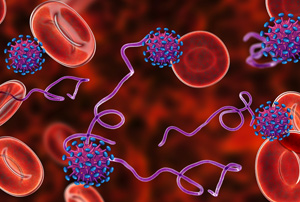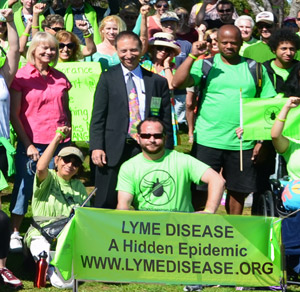- Home
- Find A Physician
- FIND A PHYSICIAN
- LymeTimes
- Current Issue
- Archives
- FEATURED LYMEDISEASE.ORG ISSUES
- Resources
- LYME LITERATE PHYSICIAN VIDEOS
- Physicians
- Members
- About Us
- Resources
I have been practicing medicine long enough to be very skeptical of “breakthroughs.” But disulfiram may be the real thing. Let’s keep our fingers crossed.

Almost everyone who reads the financial pages has heard of Steven Cohen, the multi-billionaire hedge fund manager and philanthropist. Cohen lives in Connecticut where his wife, Alexandra, became ill with Lyme disease.
The Cohens established the Cohen Lyme and Tickborne Disease Initiative, a division within their philanthropic organization focused on supporting Lyme and tick-borne disease research. The Steven & Alexandra Cohen Foundation has committed more than US$60 million to support more than 25 Lyme disease research projects.
In 2016, the Cohen Foundation sponsored the first annual Lyme Disease in the Era of Precision Medicine Conference at the Mount Sinai School of Medicine in New York.
Those of us who actually treat Lyme disease know there is nothing precise about it. Treating chronic infection associated with Borrelia burgdorferi, complicated by any number of co-infections, is often hit or miss. Nevertheless, we who practice where the rubber meets the road are grateful for whatever clues basic research provides that can help our patients.
At that conference, Kim Lewis, leader of Northeastern University’s Antimicrobial Discovery Center, presented data on the relative effectiveness of different antibiotics against Borrelia burgdorferi in his laboratory.1 Lewis was testing different pharmaceuticals against Bb, and one of the drugs he tested was disulfiram, also known as Antabuse.
What Is Disulfiram?
Let’s take a step back. If you drink alcohol, your body converts it to acetaldehyde via the enzyme alcohol dehydrogenase. Acetaldehyde is then broken down to acetic acid via the enzyme acetaldehyde dehydrogenase (see the flowchart below).

Disulfiram inhibits the enzyme acetaldehyde dehydrogenase, leading to a buildup of acetaldehyde.
This is bad news if you drink alcohol, because acetaldehyde is responsible for the symptoms we know as hangovers. This drug is prescribed to alcoholics as a deterrent to drinking alcohol, since having just one drink will result in a vicious headache.
It turns out that disulfiram has known activity as an antimicrobial. Studies have demonstrated its action against gram-positive bacteria such as Staphylococcus and Streptococcus species2 as well as Plasmodium falciparum, a.k.a. malaria.3
Number One against Borrelia burgdorferi
In 2016, Venkata Raveendra Pothineni and his colleagues at Stanford reported on new drug candidates against Borrelia burgdorferi using a technique known as high-throughput screening.4 They ranked disulfiram as number one in activity against Bb among their top 20 hits……Join or login below to continue reading.
You must be a LymeDisease.org member to access this content.




























